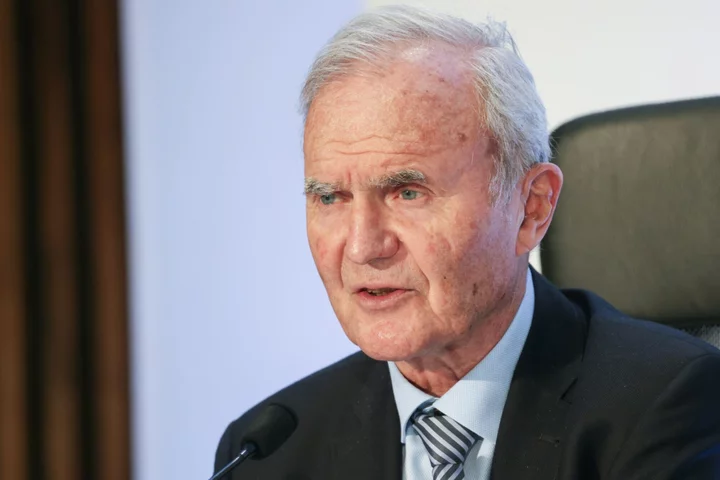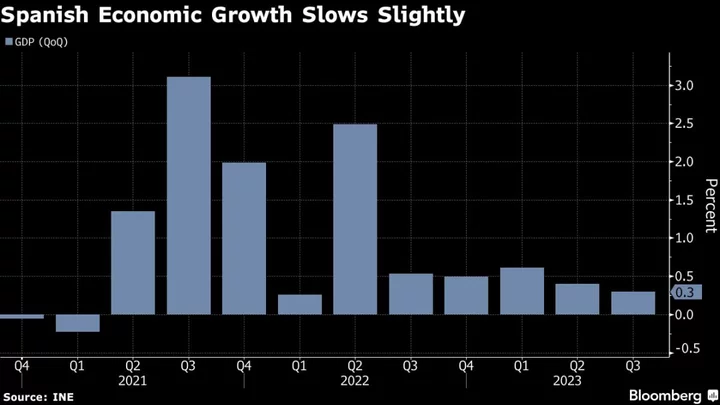When Otmar Issing became chief economist of the fledgling European Central Bank a quarter of a century ago, he was greeted with a letter from one of the project’s leading skeptics.
Milton Friedman, the Nobel-Prize winning monetarist, had publicly warned of the dangers of trying to fuse the currencies of 11 sovereign nations into one.
Issing, a German academic, harbored his own doubts. He still found himself building an institution designed to ensure the euro would defy such predictions and succeed.
“We had become friends years before and among the many congratulations, his letter was on my desk,” he told Bloomberg Television in an interview.
“I opened it, and Milton said: ‘Dear Otmar, congratulations on an impossible job. You know I am convinced the euro will fail, but’ – and then he added — ‘but because of you, collapse might be delayed by some years,’” Issing recalled.
The currency has survived arguably far longer than Friedman would have anticipated. But the inherent fragility he warned about has been a persistent headache, witnessed in the sovereign-debt crisis of the past decade and more recent bouts of turmoil.
ECB President Christine Lagarde, whose institution will turn 25 on Thursday, acknowledged that tension at a celebration last week. Its founders “could never have imagined the crises that lay ahead,” she said.
One of the officials present at the ECB’s birth, and long seen as an archetypal monetary hawk, the 87-year-old Issing has plenty to reminisce about on the challenges of creating a central bank in a multi-country currency union from scratch. Here’s a selection of some of his comments.
Kohl’s Doubts
Issing, a career academic, was a board member of Germany’s Bundesbank, led at the time by Hans Tietmeyer, when he was tapped to become the country’s appointee to the ECB Executive Board with the responsibility of establishing and leading its economics and research efforts. But in Issing’s words, Chancellor Helmut Kohl needed some convincing.
“He asked Tietmeyer one day: ‘Has this professor ever said something positive on the euro?’ And Tietmeyer, as he told me later, said: ‘Probably not.’ But finally, Tietmeyer convinced the chancellor and the finance minister that nominating me would give much credibility to this position in the board.”
German Concerns
Many Germans were highly skeptical about relinquishing the Deutsche mark, the national currency whose stability many associated with the country’s prosperity in the postwar period.
“To give up the DM and accept the new common currency, the euro, was a deep break in German — not only monetary history — it was deep felt in society. So to have a start like we had, it also was seen as impossible. But we managed it.”
Starting Up
Such was the challenge in building up a central bank out of nothing, that Issing initially admitted to himself that the whole project might not work.
“The international press, especially the Anglo-Saxon, was very critical. Imagine this ECB at the start in June 1998 had 400 staff, and the national central banks — at that time 11 of them — 55,000. So it made a mockery up of our small institution. And you see the transition from 11 currencies to one has never happened before in history. This was really a unique event.”
Policy Critique
Issing looks on the period of low inflation after the global financial crisis as a missed opportunity. He says central banks nurtured widespread expectations that they could solve all problems when they ought to have emphasized the limits to their powers.
“It’s difficult to explain what monetary policy can do and what it cannot do. And this ‘what we cannot do’ was almost missing in messages from central banks at the time. Central banks all the time cannot keep unemployment low. It’s a combination of wage policy, government policies etc. Central banks can contribute by keeping the value of the money stable, but they have I think they’ve missed to teach the lesson.”
Rate View
Now inflation is back, and while Issing acknowledges that financial-stability concerns have shifted the backdrop, he says central banks can’t afford to stop tightening monetary policy until consumer prices are definitively under control.
“It would be a mistake to stop too early fighting inflation. Because if inflation would move up again – and there is a risk for that, because core inflation if you look at that is still 5.5 percent and it looks very stubborn, that is a high rate – so this risk of an inflation turning up again must be taken serious. And it would be very, very dangerous for the reputation of the ECB and other central banks if they would have to raise interest rates again later, stronger.”
Germany Again
Issing sees Germany at a turning point as it revisits the pillars of its prior success — the US security guarantee, cheap Russian energy and Chinese demand for its exports — all while globalization slows and its population ages.
“All these aspects hurt Germany, especially because it’s an export-oriented economy. Take the car industry, the German car industry. I think Germany produced the best cars in the world, was a major player in car markets in the world. But now with the carbon time coming to an end on electrification, Germany’s certainly not the leader. And this is an industry which has created so many jobs. Not only the car industry, but the longer production line. And this an industry where the highest wages were paid down. So Germany is rapidly greying — look at me – and shrinking.”
--With assistance from Alexander Weber and Michael Smith.









